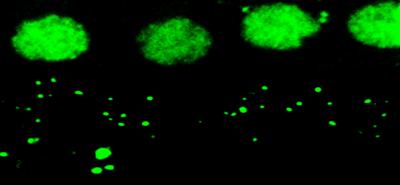Neuroscientists publish first genome-wide association study on hearing loss from noise, a common workplace hazard.
University of Southern California - Health Sciences - In a new genome-wide association study, an international team led by Keck Medicine of the University of Southern California (USC) neuroscientists has found evidence that some people may be more genetically susceptible to noise-induced hearing loss than others.
Noise-induced hearing loss is one of the most common work-related illnesses in the United States, according to the National Institute for Occupational Safety and Health. At especially high risk are troops in the Armed Forces. In 2013, the Department of Veterans Affairs reported hearing loss as one of the most common disabilities among veterans receiving disability compensation.

Immunostained mouse auditory nerve synapses after noise exposure. A team led by Keck Medicine of USC neuroscientists first to publish genome-wide association study for noise-induced hearing loss in mice. Image by Rick A. Friedman Lab.
Those at higher, genetic risk for hearing loss may decide to take additional precautionary measures to protect their hearing prior to hazardous noise exposure, study authors say.
"Understanding the biological processes that affect susceptibility to hearing loss due to loud noise exposure is an important factor in reducing the risk," said Keck Medicine of USC otologist Rick A. Friedman, M.D., Ph.D., professor of otolaryngology and neurosurgery at the Keck School of Medicine of USC and senior author of the study. "We have made great advances in hearing restoration, but nothing can compare to protecting the hearing you have and preventing hearing loss in the first place."
The study, "Genome-wide association study identifies Nox3 as a critical gene for susceptibility to noise-induced hearing loss," appears in the April 16 edition of PLOS Genetics, a peer-reviewed scientific journal.
While some gene association studies on noise-induced hearing loss in people have been conducted in the past, all were very small and their results un-replicated. Genome-wide association studies, or GWAS, search the entire genome for common genetic variants to see if any of those variants are associated with a trait. Mouse GWAS have lead to the discovery of hundreds of genes involved in complex traits that have immediate relevance to people.
In the USC study, conducted at the Zilkha Neurogenetic Institute, Friedman's team identified the Nox3 gene, which is almost exclusively expressed in the inner ear, as a key gene for susceptibility to noise-induced hearing loss. Using 64 of the 100 strains of mice in the Hybrid Mouse Diversity Panel, the team was able to increase the statistical power of its investigation, leading to the first published GWAS for noise-induced hearing loss in mice.
More research is necessary before clinical recommendations can be made.
The study was conducted in collaboration with scientists from Brazil's Federal University of Rio Grande do Sul and UCLA. Other Keck School of Medicine of USC authors include Joel Lavinsky, Amanda L. Crow, Juemei Wang, Ksenia A. Aaron, Maria K. Ho, Qingzhong Li, Pehzman Salehide, Anthon Myint and Maya Monges-Hernadez. The study was supported in part by the National Institutes of Health (R01DC010856-01,T32ES013678, R01ES021801, 3R01ES021801-03S1, UL1TR000130, P30ES007048, R01 ES022282), California Institute for Regenerative Medicine (TG2-01161) and Coordenação de Aperfeiçoamento de Pessoal de Nível Superior (7342-13-6).
Source: https://www.eurekalert.org/pub_releases/2015-04/uosc-kmo040915.php

